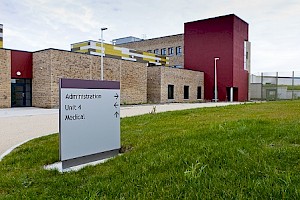Youth Justice
Ireland has a long history of poor responses to offending behaviour by children. A core strand to IPRT's work since its establishment in 1994 has been the promotion of a more effective youth justice system, with emphasis on non-custodial alternatives, diversion, early intervention and prevention strategies and programmes. Central to our work was ending the practice of detaining children in adult prisons, which was in breach of international human rights standards and a serious stain on Ireland's human rights record.
International human rights standards, and in particular the provisions of the UN Convention on the Rights of the Child, are clear that custody for children should only be used as a last resort and for the minimum required period of time. All efforts should be made to apply alternatives to detention to ensure that such a measure is only used in exceptional circumstances.
In Ireland, the Children Act 2001 recognizes the principle of detention as a last resort. The Act prohibits the imprisonment of children and the Criminal Justice Act 2006 makes provision for all children less than 18 years of age to be detained in Children Detention Schools. The detention school model is focused on a model of care, education, health and programmes that address offending, with improved outcomes for the young people, their communities and all of society. The Irish Youth Justice Service is responsible for the Children Detention Schools, within the Department of Children and Youth Affairs.
Following years of sustained advocacy by IPRT, along with many national and international bodies, in 2012 the detention of boys aged under 17 at St Patrick's Institution ended. In March 2017, a Ministerial Order ended the sentencing of children aged under 18 to adult prison in Ireland, and in April 2017, St. Patrick’s Institution was finally closed. Since September 2017 boys aged under 18 are no longer detained in the adult prison system.
IPRT continues to work towards progressive change in youth justice policies and practice, as well as engaging with wider policy and practice issues relating to youth justice, such as the provision of alternatives to detention, diversion and early intervention programmes.

Irish Youth Justice Service Annual Report 2009
11th August 2010
The Irish Youth Justice Service has released its annual report detailing the progress made on the implementation of the National Youth Justice Strategy throughout the course of 2009.

NY and UK: Use of restraint in youth custody
19th July 2010
NY Times reports on a significant expansion of mental health services for youths in custody and new restrictions on the use of physical restraint, just as the Observer (UK) reports on shocking revelations about 'Physical Control in Care' manual used in private jails for young offenders.
Irish Examiner: Lack of supports for vulnerable young people
16th July 2010
Jennifer Hough, in the second part of an Irish Examiner special investigation on youth justice, highlights issues of concern within the juvenile criminal justice system and the lack of early intervention services made available to young offenders.
England & Wales: New report urges greater use of restorative justice in reducing youth offending
15th July 2010
Restorative justice crucial to making a fresh start in tackling youth crime, according to a new report. ‘Time for a Fresh Start’ is the result of the first-ever independent inquiry into youth crime and antisocial behaviour.

Irish Examiner: Led Astray - Lost Young Lives
15th July 2010
In a 2-day special investigation in the 'Irish Examiner', Jennifer Hough examines how to balance appropriate punishment of young offenders with victims' rights.
Telegraph: This case was no aberration - it's the system we created
26th May 2010
The case for raising the age of criminal responsibility comes to the fore again in England.
Sunday Tribune: €500k a year each to house troubled teens
23rd May 2010
The levels of funding for Children Detention Schools should be matched for prevention and early intervention schemes.
Guardian: Magistrate defends 'scum' description of teenage vandals
18th May 2010
Magistrate who branded two teenage boys 'absolute scum' claims he was merely using their language to get through to them.
US Supreme Court Repeal Life Without Parole for Juveniles
17th May 2010
The US Supreme Court has repealed laws which enabled states to imprison children convicted of non-homicide offences without the possibility of parole.
Irish Examiner: Roll-out of Successful Juvenile Programme
13th May 2010
A scheme which showed a 64% drop in youth crime is to be rolled out nationally.




